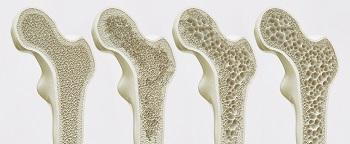As you might imagine, women’s bones are smaller than men’s, which puts women at a risk for developing osteoporosis, a chronic condition that causes a loss of bone density and can leave women prone to fractures. According to the National Osteoporosis Foundation, 80 percent of Americans with osteoporosis are women and half of women over the age of 50 will break a bone due to osteoporosis.
and half of women over the age of 50 will break a bone due to osteoporosis.
Why does osteoporosis mostly affect women? During childbearing years, your body produces estrogen, a hormone that is not only implemental in your reproductive and sexual health but also serves to protect your bones; however, as women approach menopause their estrogen production decreases drastically, which makes women prone to fractured and broken bones.
Fortunately, your gynecologist and women’s health team are instrumental in the prevention, diagnosis, and treatment of osteoporosis. Bone density is influenced by many factors including hormone levels, lifestyle, nutrition, medications, health problems, and genetics. Common risk factors include:
- Family history
- History of broken bones/fractures
- Poor nutrition
- Smoking
- Heavy alcohol consumption
- Lack of calcium or other vitamins in your diet
- Sedentary lifestyle
- Dementia
- Low body mass index (BMI) and weight
The good news about osteoporosis is that it can be prevented through proper screenings and medications/therapies used to slow the progress of osteoporosis. Your initial screening will provide the information you need to help you and your gynecological team make an informed decision about the type of treatment options available to you. An X-ray is the most common diagnostic tool for checking the density level of your bones.
Getting an osteoporosis screening is highly recommended for all postmenopausal women (women 65 years old or older). If a woman is at an increased risk of developing osteoporosis, she may want to consider getting screened even earlier.
Osteoporosis treatment will include lifestyle changes along with medications/treatments. Simple everyday measures you can take to lessen your chances of bone fractures include:
- Making sure you get enough Vitamin D and calcium in your diet
- Reducing alcohol consumption
- Exercise regularly (include both cardio and strength training)
- Quit smoking
There are also a variety of different prescription medications on the market (also known as bisphosphonates) that can aid in preventing bone loss. Along with medications, your gynecologist may also recommend hormone replacement therapy (HRT), which will supply your body with the estrogen it needs to both prevent and treat osteoporosis.
